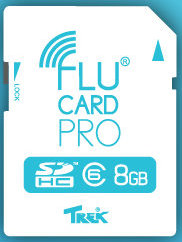 Trek CFO Gurcharan Singh. NextInsight file photo.Children's toys with wi-fi capability. Car components and personal wearables that are also wi-fi enabled.
Trek CFO Gurcharan Singh. NextInsight file photo.Children's toys with wi-fi capability. Car components and personal wearables that are also wi-fi enabled.
In such diverse applications, which began with high-end digital cameras, the proprietary wi-fi modules of Trek 2000 are being adopted.
Trek 2000 continues to widen the applications of its patented FluCard and its wi-fi modules -- and will do so without a large corresponding increase in operating expenses, said CFO Gurcharan Singh at a 1Q15 results briefing.
Operating on an asset-light business model, Trek outsources the production of its products to OEMs while devoting itself to R&D.
Its revenue and profit growth look set to accelerate as does its profit margin. The Flucard, which has unique wireless SD card technology, has patent protection across major jurisdictions, including USA, UK, European Union, China and Korea.RHB Research analyst Jarick Seet has kept his forecast of US$9.3 m net profit for FY15. If it materialises, it's certainly a massive increase from the US$2.5 m achieved in FY14.
The Flucard, which has unique wireless SD card technology, has patent protection across major jurisdictions, including USA, UK, European Union, China and Korea.RHB Research analyst Jarick Seet has kept his forecast of US$9.3 m net profit for FY15. If it materialises, it's certainly a massive increase from the US$2.5 m achieved in FY14.
Jarick's forecast for revenue in 2015 is U$151 million against US$113 m last year.
At the 1Q results briefing, Gurcharan highlighted that the Internet of Things (IoT) is a fast-growing market which the FluCard and wi-fi modules will ride on. Trek's products wil play a role in enabling a diverse range of devices to become Web-connected.
Trek has recently turned its focus on the automobile industry. Trek is in talks with second-tier manufacturers on incorporating its wi-fi modules into parts of the car such as the sound system.
The wi-fi capability enables car data to be communicated to devices such as the car-owner's mobile phone and tablet. Content such as music can also be transmitted in the other direction.
Target: Solid state drive market The JV, UniMemory Technology (S) Pte Ltd, has a paid up capital of US$5.0 million, of which Trek’s share is US$3.5 million for its 70% stake in UniMemory. |







